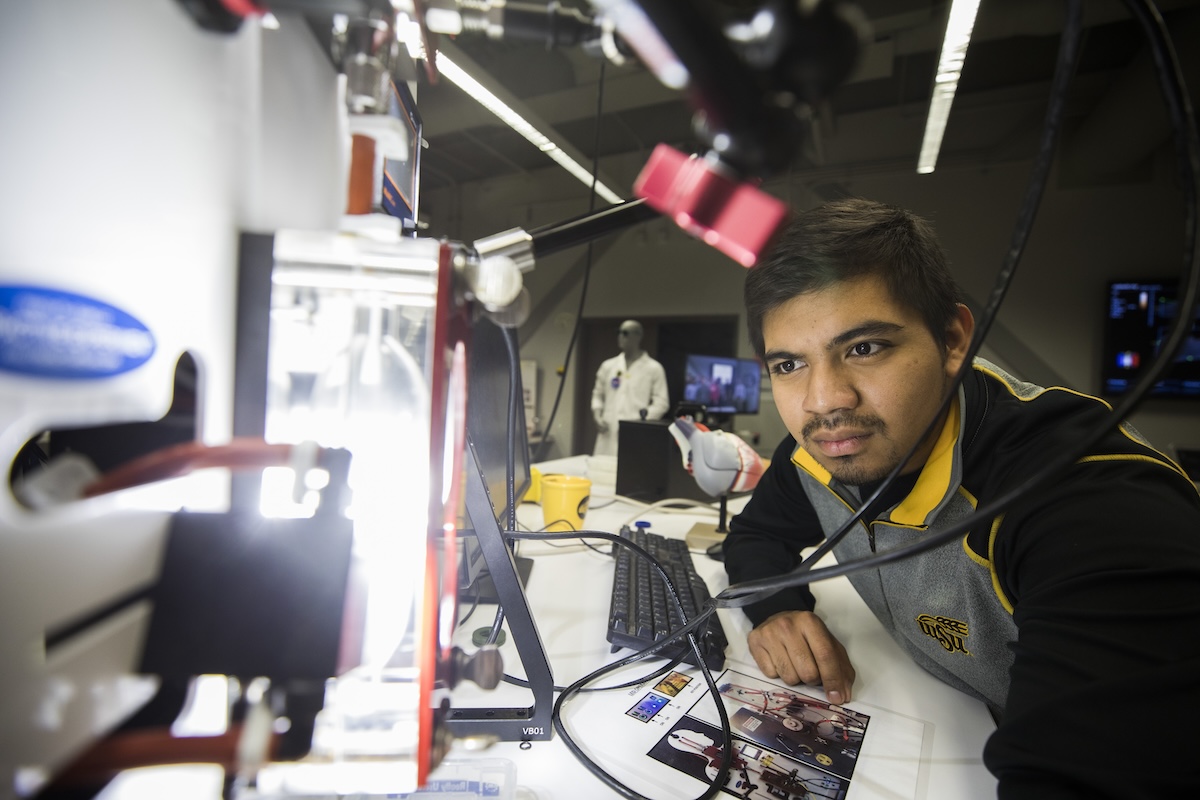Biomedical Engineering Undergraduate Program
The undergraduate program in Biomedical Engineering is a 128/129 credit hour ABET accredited Bachelor of Science degree program that is based upon engineering fundamentals, mathematics, physics, anatomy and physiology, chemistry, organic and biochemistry, biology, biomechanics and biomaterials. Students in the biomedical engineering program acquire the capability to make measurements on and interpret data from living systems, addressing problems associated with the interaction between living and non-living materials and systems.
Mission
The mission of Wichita State University's Biomedical Engineering program is to provide students a comprehensive education, including integration of life sciences and engineering principles, to prepare students to address health needs at the local, national and global levels.
Program Educational Objectives
The educational objectives of the Biomedical Engineering program are driven by Wichita State University's mission to be an essential educational, cultural, and economic driver for Kansas and the greater public good, as well as the Biomedical Engineering program mission to prepare students to address health needs. Specifically, Biomedical Engineering program alumni, within a few years of receiving their baccalaureate degree, will be successful professionals as evidenced by having:
- Secured employment in engineering, biomedical, life-science, and/or health-related professions
- Pursued professional development, including further study in graduate or professional schools
- Served in leadership roles in addressing societal needs at the local, national, and global levels.
Student Outcomes
Graduates of the Biomedical Engineering program will have:
- An ability to identify, formulate, and solve complex engineering problems by applying principles of engineering, science, and mathematics
- An ability to apply engineering design to produce solutions that meet specified needs with consideration of public health, safety, and welfare, as well as global, cultural, social, environmental, and economic factors
- An ability to communicate effectively with a range of audiences
- An ability to recognize ethical and professional responsibilities in engineering situations and make informed judgments, which must consider the impact of engineering solutions in global, economic, environmental, and societal contexts
- An ability to function effectively on a team whose members together provide leadership, create a collaborative and inclusive environment, establish goals, plan tasks, and meet objectives
- An ability to develop and conduct appropriate experimentation, analyze and interpret data, and use engineering judgment to draw conclusions
- An ability to acquire and apply new knowledge as needed, using appropriate learning strategies.
Accreditation
The Biomedical Engineering program is fully accredited by the Engineering Accreditation Commission of ABET, www.abet.org, since 2014.
Sequence of Courses
| Sequence of Courses (Effective Fall 2024) | |
|---|---|
| Freshman Year BME 115 (Biomedical Engineering Seminar) ENGL 101 and 102 (College English I and II) CHEM 211 and 212 (General Chemistry I and II) MATH 242 and 243 (Calculus I and II) Physics 313 (Physics for Scientists I) First Year Seminar* |
Hrs 0 6 10 10 4 3 |
|
Sophomore Year |
Hrs |
|
Junior Year |
Hrs |
|
Senior Year |
Hrs 3 9 3 3 3 9 3 |
*Refer to graduation requirements of the university undergraduate catalog for details.
**15 hours of Engineering Technical Electives are required. Click here to see the list of eligible Engineering Technical Elective courses.
***3 hours of Open Electives can be considered. Click here to see the list of eligible Open Elective courses.
Learn More
To learn more about the Bachelor of Science in Biomedical Engineering, visit the Undergraduate Catolog.


